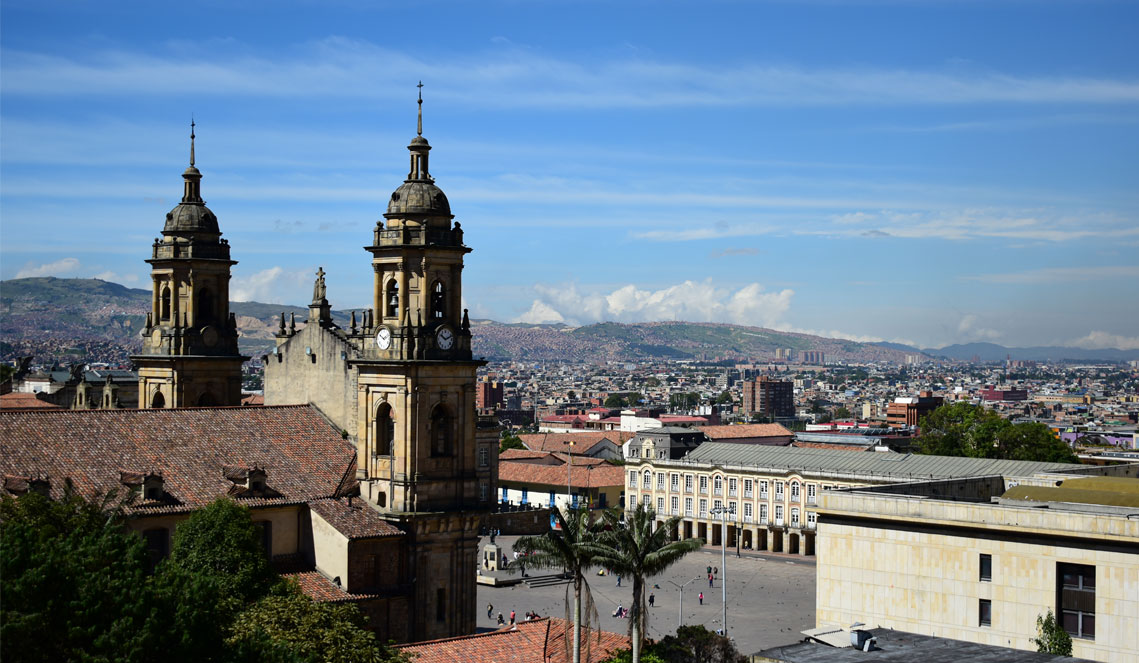

April 18, 2024, 10:30 am
The souls of the dead are thought to return each year to visit with their living relatives. The approach in Colombia is much more solemn than the graveyard venerations and festivities held in other countries like Ecuador and Mexico. On this Day of the Dead, Uncover Colombia respectfully investigated Bogota's historic Candelaria district in search of a ghost tale or two.
Like other cities encrusted in centuries of history, Bogota has amassed its fair share of unnerving tales and ghost stories. Some stories have been embellished into urban legends but city-dwellers of Bogota maintain other stories are authentic, with sightings of ghosts and the sensing of presences not an entirely unusual occurrence. The lost souls, which haunt La Candelaria, do not always need to be summoned to unveil themselves as apparitions. Such an abundance of ghost appearances and hauntings might be related to the fact that cemeteries are a relatively new development and for hundreds of years, dead people used to be buried in the grounds of their homes. Other spirits project themselves to the living in the most important and memorable places of their human lives - many of their souls have not quite passed on to the afterlife.
Our first story relates to a petite protagonist who settled in La Candelaria. Mañuela Sáenz was the lover of El Libertador, Simón Bolivar for the last 8 years of his life. In her lifetime, she was renowned for making rousing speeches to troops before they raced off to fight Spanish soldiers, and on occasion, she even followed Bolivar into revolutionary battle. On 25th September 1828, there was a conspiracy to assasinate Bolivar who was residing in San Carlos Palace in Bogota. From her balcony, a block away on Calle 10, Mañuelita saw a hostile mob marching up the street to lynch him. She ran to Bolivar where he was found taking a bath and implored him to leave immediately. He managed to escape through a back window before the horde could capture him. Simón Bolivar who had led Gran Colombia to independence from Spanish rule and helped lay the foundations for democracy in Latin America, was saved. Alas, poor health ensued and only two years later, in 1830, Bolivar, aged 47, died of tuburculosis in northern Colombia. His enemies came to power in Colombia and Ecuador, and Mañuelita was not welcome in these countries. She lived the rest of her life away from Bogota under uneasy circumstances until her death in northern Peru during the diptheria epidemic of 1846. Her body was buried in a communal, mass grave and her belongings were burned.
Residents of La Candelaria in Bogota have witnessed a spirit with lustrous black hair that leaps down from the balcony of Manuelita's house on to the cobbles and runs in the direction of Palacio San Carlos – perhaps so that she can be with her lover forevermore. Legend has it that the spirit is not dressed like that of a woman but wears trousers and a tailored shirt, much like how Mañuelita dressed when she rode her horse into battle complete with drawn-on moustache.
Or could it be that Mañuelita is actually on her way to the nearby government palace? For, inside Palacio Nariño, on the second floor hallway in front of the Emerald room there is a marble bust of Simón Bolivar. There is also a German piano that used to belong and be played by Manuelita Sáenz. Presidential guards stay away from that hall during the night because some of them have seen and heard a long-haired spirit in a white dress playing melodies on the piano.
On 5th July 2010, Manuela Sáenz was given a full state burial in Venezuela. However, as she had been buried in a mass grave, no official remains of her existed for the state burial; instead 'symbolic remains', composed of some soil from the mass grave into which she was buried during the epidemic, were transported through Peru, Ecuador and Colombia to Venezuela. Those remains were placed in the National Pantheon of Venezuela alongside those of her lover, Bolívar, who is memorialised at that monument.
Our second story relates to a colonial house in Bogota which served as a residence to Simón Bolivar after the War of Independence and now used as a museum dedicated to Bolivar's life and times. At the top of the beautiful gardens of the Quinta de Bolivar are heated pools under a Grecian arch. On some nights, security guards claimed to have seen a bent-over, gnarled figure making its way up the back steps to the heated pools. History books re-count that during Bolivar's last year he would make his way up to the pools at night to bathe and cool his temperatures which were high due to his suffering malaria.
The same guards worked late night shifts patrolling the grounds of Bolivar's house. They grew accustomed to the noises that they heard every night that came from the stables to the side. The low rumbles, nasal snorts, and stamping of war horses. But the stables were empty. Guards have requested transfers and even left their jobs in order to rid themselves of the sound of hooves on cobble. Legend has it that once you have heard the horses of Bolivar they will never leave you. Some of the braver guards tell of Bolivar's own horse Palomo, pacing in the courtyard awaiting the return of his master from his grave far away in Venezuela. The guards say the horses remain only to watch over their master's house and they can only rest when their master's spirit is back at the residence.
Every year on All Saints Day, Latin Americans pay their respects to their deceased loved ones and perhaps spare a thought for their Libertador, Simón Bolivar and his beloved Mañuelita Sáenz, be it at their tombstone in Caracas, Venezuela or their spiritual home together in La Candelaria, Bogota.
Share with your traveller friends!




